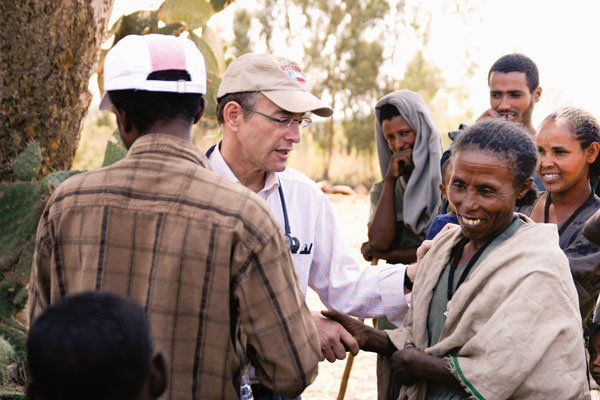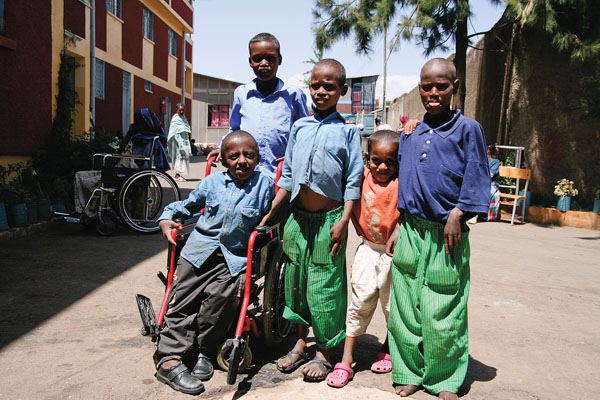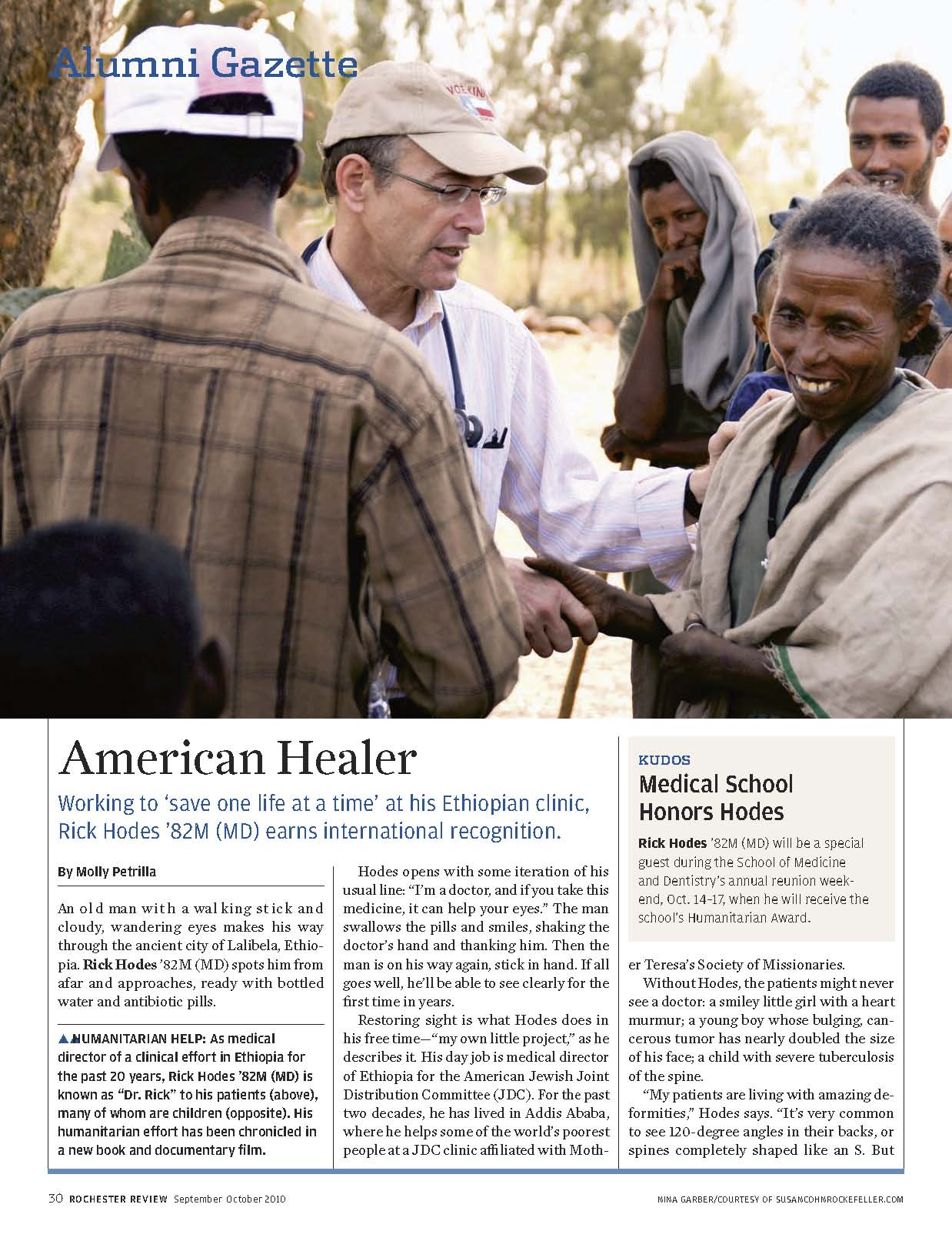Alumni Gazette
 HUMANITARIAN HELP: As medical director of a clinical effort in Ethiopia for the past 20 years, Rick Hodes ’82M (MD) is known as “Dr. Rick” to his patients (above), many of whom are children (opposite). His humanitarian effort has been chronicled in a new book and documentary film. (Photo: Nara Garber/Courtesy of SusanCohnRockefeller.com)
HUMANITARIAN HELP: As medical director of a clinical effort in Ethiopia for the past 20 years, Rick Hodes ’82M (MD) is known as “Dr. Rick” to his patients (above), many of whom are children (opposite). His humanitarian effort has been chronicled in a new book and documentary film. (Photo: Nara Garber/Courtesy of SusanCohnRockefeller.com)An old man with a walking stick and cloudy, wandering eyes makes his way through the ancient city of Lalibela, Ethiopia. Rick Hodes ’82M (MD) spots him from afar and approaches, ready with bottled water and antibiotic pills.
Medical School Honors Hodes
Rick Hodes ’82M (MD) will be a special guest during the School of Medicine and Dentistry’s annual reunion weekend, Oct. 14–17, when he will receive the school’s Humanitarian Award.
Hodes opens with some iteration of his usual line: “I’m a doctor, and if you take this medicine, it can help your eyes.” The man swallows the pills and smiles, shaking the doctor’s hand and thanking him. Then the man is on his way again, stick in hand. If all goes well, he’ll be able to see clearly for the first time in years.
Restoring sight is what Hodes does in his free time—“my own little project,” as he describes it. His day job is medical director of Ethiopia for the American Jewish Joint Distribution Committee (JDC). For the past two decades, he has lived in Addis Ababa, where he helps some of the world’s poorest people at a JDC clinic affiliated with Mother Teresa’s Society of Missionaries.
Without Hodes, the patients might never see a doctor: a smiley little girl with a heart murmur; a young boy whose bulging, cancerous tumor has nearly doubled the size of his face; a child with severe tuberculosis of the spine.
 (Photo: Nara Garber/Courtesy of SusanCohnRockefeller.com)
(Photo: Nara Garber/Courtesy of SusanCohnRockefeller.com)“My patients are living with amazing deformities,” Hodes says. “It’s very common to see 120-degree angles in their backs, or spines completely shaped like an S. But these people are living with such strength and dignity and courage that it inspires me. If I feel depressed, I just think about my patients. I love my patients, and they love me.”
The story of Hodes’s work in Ethiopia is the focus of a new book and a new documentary film that chronicle his more than 20-year effort to improve the lives of some of the poorest people in Africa. This spring, author Marilyn Berger released This Is a Soul: The Mission of Rick Hodes, a nearly 300-page account of his career as a doctor and humanitarian. And in April, award-winning filmmaker Susan Cohn Rockefeller debuted her documentary Making the Crooked Straight on HBO.
Both the book and the film follow Hodes as he treats patients, raises money for their treatment, and brings many of his young patients into his home. The adoptive father of five Ethiopian children, including three with serious spine diseases, Hodes has fostered many others. They come from different backgrounds and different religions, but Hodes treats them all as his own—right down to a weekly Sabbath that he conducts as an observant Jew.
Rockefeller describes him as “a doctor who wants to heal anyone who comes in his path.”
“I think many people get overwhelmed by the enormity of problems that face our global community,” she says. “I think Rick’s message is that you just dig in. You start with one person and you put your focus there and you work. By the end of the day, you can see that you’ve already made a difference.”
Growing up in Syosset, Long Island, Hodes read about Albert Schweitzer and Thomas Dooley, imagining himself as someday following in their footsteps. But as Hodes is the first to point out, “What does a teenage kid in Long Island really know about medicine in Africa?”
He found out in 1985 when, having earned his degree from the School of Medicine and Dentistry (which included a school-supported summer in Bangladesh and winter in India) and trained in internal medicine at Johns Hopkins University, he went to Ethiopia as a Fulbright professor. He stayed for two and a half years, and returned in 1990 for a six-week mission sponsored by the JDC. He’s been there ever since.
Primarily treating patients with heart disease, cancer, and diseases of the spine, he sends those who need advanced treatment to specialists in other countries. Spinal cases, for example, are often sent to surgeons in Ghana. Such surgeries are expensive—$13,000 per patient—and Hodes must raise the money for each procedure, primarily through individual donations.
“There’s an idea in Jewish tradition that if you save one life, you’re saving an entire world,” he says. “I’m not building medical schools or hospitals or changing the system, but what I am able to do is save one life at a time. When I can put 16 kids on a plane to Ghana for spinal surgery”—which, as it happens, he did one day in June—“it’s the greatest day of the year.”
With the book and documentary, Hodes has found a level of fame he never expected: TV appearances, interviews, film festival speeches.
“I’m a quiet guy,” Hodes says. “I don’t look for publicity, and I don’t talk about myself if it’s not necessary to, so I look at all this with a great deal of amusement.” Still, he’s happy with the result: daily inquiries about volunteer and donation opportunities to aid his work.
“At this point, I just want to keep on doing what I’m doing, and hopefully have more time, assistance, and money,” he says. “My dream would be to build my own hospital for poor people and to make it a teaching hospital, but for now, I’m happy to just keep living hand-to-mouth, in every sense.”
Molly Petrilla is a Philadelphia-based freelance writer. For more about Hodes and his work, visit rickhodes.org. For more about Making the Crooked Straight, visit www.makingthecrookedstraight.org.

